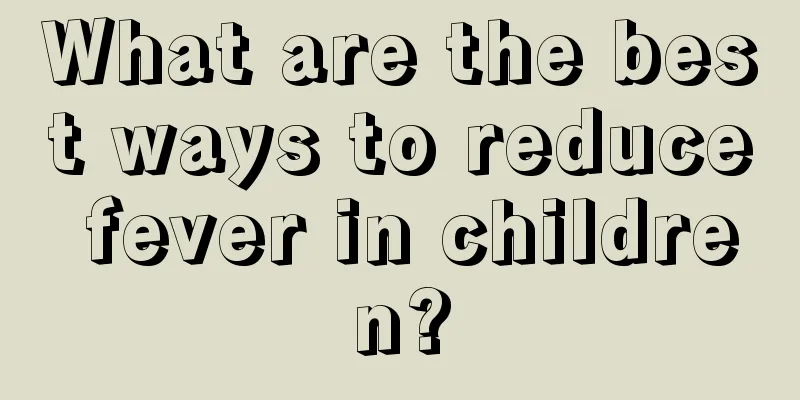What are the best ways to reduce fever in children?

|
If a child has a fever, parents will definitely be very worried. For parents, it is very necessary to know the best way to reduce children's fever. So what are the best ways to reduce children's fever? Next, this article will introduce six best ways to reduce children’s fever for your reference only. If you want to know the best ways to reduce children’s fever, you can take a look! Please see the detailed introduction below. Fever is the body's defensive response to various diseases. Studies have shown that the body's white blood cells, which are responsible for swallowing bacteria, have enhanced swallowing ability when the body temperature rises (38℃~39℃). Therefore, when a child's temperature rises due to a cold or other infectious disease, it is not wise to use every possible method to immediately lower the temperature to the normal range. Because this may reduce the patient's own resistance. Some parents use some folk fever-reducing methods, such as cold water or alcohol baths, to reduce their children's fever, which is inappropriate. When a baby has a fever and his hot skin suddenly comes into contact with cold water or alcohol, the baby will react violently and may even have convulsions. The smell of alcohol will make the baby drowsy, as if he is drunk. What are the best ways to reduce fever in children? 1. Maintain good air circulation in your home If your home has air conditioning, maintain the room temperature between 25~27℃. You can place the child in an air-conditioned room or blow an electric fan around him to slowly lower his body temperature, which will make the child feel more comfortable. But if the limbs are cold and the patient is shivering violently, it means that the patient needs warmth, so he should be covered with a blanket. 2. Take off excess clothing If your baby's limbs, hands and feet are warm and he is sweating all over, it means he needs to dissipate heat and he can wear less clothes. 3. Warm water bath Undress the baby and rub the whole body with a warm water (37℃) towel. This will dilate the blood vessels in the baby's skin and release body qi. In addition, when water vapor evaporates from the body surface, it will also absorb body heat. 4. Sleep with an ice pillow It helps to dissipate heat, but it is not recommended for younger children because it is difficult for them to turn their bodies and the ice pillow can easily cause local overcooling or hypothermia. You can also use a cooling patch. When the water in the gelatinous substance of the cooling patch evaporates, it can take away the heat and will not cause excessive cooling. 5. Drink plenty of water To help sweating and prevent dehydration. Water has the function of regulating temperature, which can lower body temperature and replenish water lost in the baby's body. 6. Use antipyretics When the core temperature (rectal temperature or ear temperature) of an infant or young child exceeds 38.5℃, antipyretic solutions or suppositories can be used appropriately. The above is an introduction to the best ways to reduce fever in children. I believe that after reading the above introduction, you already know the best ways to reduce fever in children. The six methods of reducing fever in children introduced above are all very common methods and are also the best ways to reduce fever in children. If parents find that their children have a fever, they may try the fever-reducing methods introduced above! |
<<: What are the best ways to reduce fever in children?
>>: What to do if your child's face is scratched
Recommend
What food should children eat if they have dry stools?
When children have dry stools, parents should pay...
When should I be discharged from the hospital for premature delivery at 31 weeks of pregnancy?
Premature birth at 31 weeks is quite harmful to t...
Can a child's gene mutation be treated?
From a scientific point of view, gene sequences a...
What to do if children have dry lips
In autumn and winter, the weather is the driest. ...
How to make baby noodles
As the baby grows day by day, we need to add some...
What are the symptoms of myocarditis in children? The following three will tell you
Myocarditis in children is a common heart disease...
Makeup Tips for Kids
The annual Children's Day is approaching, and...
Why does my child’s lower eyelid become red and swollen?
If we find that our eyelids are red and swollen i...
What should I do if my two-month-old baby hasn’t defecated for two days?
Everyone knows that when the baby is still in the...
How much water should a newborn baby be fed?
?In addition to milk, newborns also need to drink...
What should I do if my child has a sore throat?
For children, throat suppuration is a very painfu...
Why do children sweat when they sleep?
If a child sweats while sleeping, he is not only ...
What should I do if my baby always has eye mucus?
The baby always has eye mucus. Mostly it’s becaus...
How to do baby defecation exercises?
The health of the baby is very important to paren...
Child coughing in the morning
If a child has symptoms of coughing in the early ...









